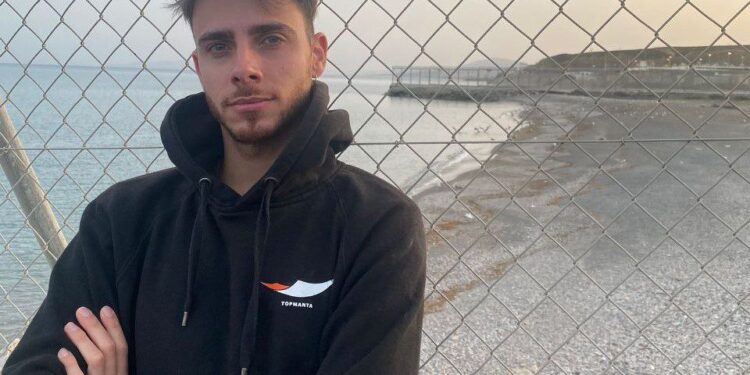Accepting the new global reality means recognising the increasing disappearance of cultural and even physical barriers. Activists like Ernesto Maleno are championing and working in Spain with the concept of transculturality to promote integration across borders.
Ernesto Maleno is a Spanish-Moroccan political scientist, communicator and activist who stands out for his work in different areas of human rights. He started on the Spanish-Moroccan border with the organisation Caminando Fronteras and continues his efforts to humanise a harrowing and deadly process. In the last two years, he has also collaborated with Save the Children, defending the rights of children on the move. Ernesto is currently working with the Andalusian Youth Institute in the integration of young people with a focus on transculturality and spirituality.
Pressenza: For many years you worked with the collective Caminando Fronteras with the aim of humanising a heartbreaking reality that claims the lives of thousands of people every year. Today your work is more linked to the integration of young people, with a focus on transculturality and spirituality. Could you first of all define transculturality for us?
Ernesto Maleno: Transculturality is the reality to which we are called in these times. This is a historical era of globalisation, with its negative aspects, but also its positive elements. We are facing the possibility of distances shortening, of borders being challenged. We see people from one side and the other side pairing up. Transculturality is an identity where we can all recognise each other and where there is also a lot of virtue in solving certain historical problems that we have been dragging along. Problems that precisely represent a stagnant vision, of sides and trenches, where no one can inhabit greys.
PZ: What elements learned on the border have you been able to apply in your work today, which is more focused on, as we were saying, transcultural integration?
EM: The border opens you up to that raw dimension of what our lives can be, of what happens in the world that we don’t want to see, violence in a very clear way. In that destiny that is the border you can see youth in countries that are not the countries of their parents, or even where they were born, but where they plant a seed that takes root and later germinates. In general, all places can be origin or destination. There is no place that is more civilised than another.
If we look at the Spanish reality, there are already many generations of young people whose parents immigrated. They are completely reshaping the Spanish identity. An identity that already in the 20th century was denied to many Spaniards by the dictatorship, which told us how to be a Spaniard and a unique way of being a Spaniard.
Now we face yet another challenge, no longer just a plurinational state, but a transcultural state.
PZ: How do borders, especially the Spanish-Moroccan border, which is one of the bloodiest, deny that we all share a series of common cultural traits that go beyond the physical aspect?
EM: When you scratch the chronology of the border reality you realise that, although we think that this is something eternal, that the world has always been configured in this way, it is something relatively new. Until 2003, Morocco did not have foreigners. Europe has even encouraged foreigners from African countries among themselves. The Moroccan state has foreignised sub-Saharan populations that used to move freely along these routes.
Realise that it does not have to be an eternal reality, that it is not an absolute dogma. The global reality in which we live today seems to be of interest only for certain products, services, for certain commodification. The same applies to the privilege of passports, some of which are good and some of which are not. How must a child in the medina of Tangier feel when he sees tourists constantly walking through its streets while he glimpses those 14km away from Spain, a place he cannot go to? It is the fact of not being able to go even if he has the need to eat, to live, to give his parents a better future.
PZ: Your experience includes many of the fundamental human rights. I have the feeling that for many, including myself, it is sometimes perceived as impossible to cover everything. Do you think it is really possible to act effectively in all the social causes that need to be addressed?
EM: On the one hand, we have to do everything, and on the other hand, we must not get frustrated with what seems to be left undone, with a world that seems unreachable, impossible to change. We have to be deeply committed to a well understood social justice, and at the same time, we must not get upset when we realise that our action is evidently small.
Every historical epoch has its complications, and we defenders of rights exist. I’ve seen it a lot in activism, we often get entrenched and hurt, and I think that the defence of human rights should be something organic, where you don’t put the weight of the world on yourself.
I would try to direct that message of hope a little bit. We come to challenge the structures of the world that are no longer valid, with transculturality as a loving response to so much violence and disintegration.






